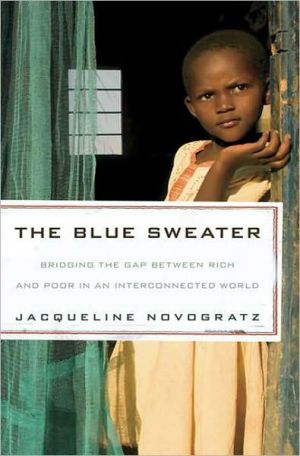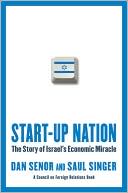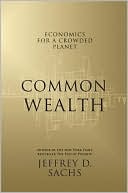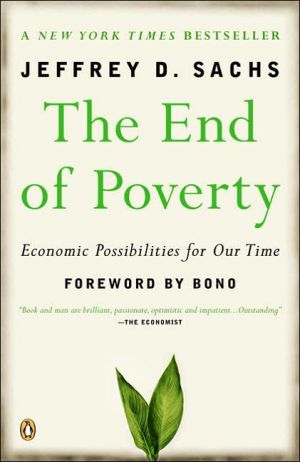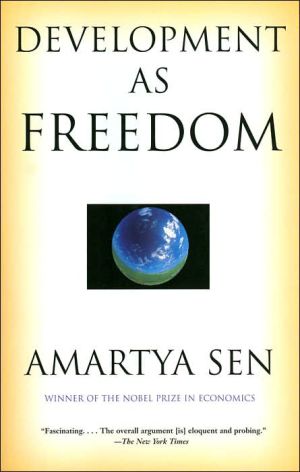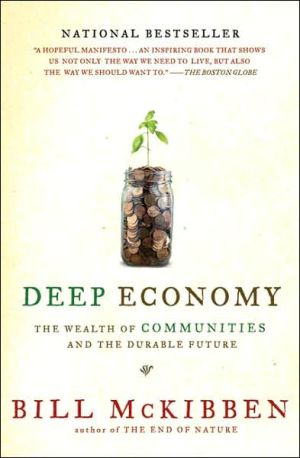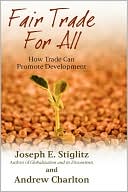The Blue Sweater: Bridging the Gap Between Rich and Poor in an Interconnected World
The Blue Sweater is the inspiring story of a woman who left a career in international banking to spend her life on a quest to understand global poverty and find powerful new ways of tackling it. It all started back home in Virginia, with the blue sweater, a gift that quickly became her prized possession—until the day she outgrew it and gave it away to Goodwill. Eleven years later in Africa, she spotted a young boy wearing that very sweater, with her name still on the tag inside. That the...
Search in google:
The Blue Sweater is the inspiring story of a woman who left a career in international banking to spend her life on a quest to understand global poverty and find powerful new ways of tackling it. It all started back home in Virginia, with the blue sweater, a gift that quickly became her prized possession—until the day she outgrew it and gave it away to Goodwill. Eleven years later in Africa, she spotted a young boy wearing that very sweater, with her name still on the tag inside. That the sweater had made its trek all the way to Rwanda was ample evidence, she thought, of how we are all connected, how our actions—and inaction—touch people every day across the globe, people we may never know or meet.From her first stumbling efforts as a young idealist venturing forth in Africa to the creation of the trailblazing organization she runs today, Novogratz tells gripping stories with unforgettable characters—women dancing in a Nairobi slum, unwed mothers starting a bakery, courageous survivors of the Rwandan genocide, entrepreneurs building services for the poor against impossible odds.She shows, in ways both hilarious and heartbreaking, how traditional charity often fails, but how a new form of philanthropic investing called "patient capital" can help make people self-sufficient and can change millions of lives. More than just an autobiography or a how-to guide to addressing poverty, The Blue Sweater is a call to action that challenges us to grant dignity to the poor and to rethink our engagement with the world. Publishers Weekly Novogratz combined her twin passions for banking and philanthropy after she left a lucrative corporate banking position to work with women's groups in microfinance, the pioneering banking strategy that won Muhammad Yunus a Nobel Peace Prize in 2006. Her work merging market systems with development and social empowerment led her to create the Acumen Fund for entrepreneurs in developing nations, which she describes as "the opposite of old-fashioned charity." Novogratz also focuses on her own developmental path as she charts her evolving views of capitalism and how she will "change the world." Unfortunately, she stumbles when she strays into biographical territory, relying on clichés to bolster her professional decisions through a personal lens. The book is most interesting when it touches on the difficult decisions that Novogratz and her team must make about financial empowerment-should they charge interest on loans to poor women? can working women find acceptance in a patriarchal society?-but these dilemmas are facilely glossed, keeping the book in an uncomfortable limbo between a personal narrative and a primer on globalization. (Feb.)Copyright © Reed Business Information, a division of Reed Elsevier Inc. All rights reserved.
CHAPTER 1\ \ INNOCENT ABROAD\ \ \ "There is no passion to be found playing small in settling for a life that is less than the one you are capable of living."\ -NELSON MANDELA
1 Innocent Abroad 12 A Bird on the Outside, a Tiger Within 183 Context Matters 324 Basket Economics and Political Realities 485 The Blue Bakery 646 Dancing in the Dark 797 Traveling without a Road Map 948 A New Learning Curve 1129 Blue Paint on the Road 13010 Retribution and Resurrection 14711 The Cost of Silence 16112 Institutions Matter 17613 The Education of a Patient Capitalist 18914 Building Brick by Brick 20915 Taking It to Scale 22816 The World We Dream, the Future We Create Together 243Acknowledgments 255Index 258
\ From Barnes & NobleBarnes & Noble Discover Great New Writers\ Young, idealistic, and well educated, Novogratz had an admirable goal: to change the world. She traveled to Rwanda, where she found a small boy wearing a sweater she recognized as her own -- one she'd given to Goodwill many years earlier. For Novogratz, that sweater served as a symbol of the interconnectedness of the rich and the poor -- a connection that wasn't working. What the poor wanted was an opportunity, not a handout. The voiceless needed donors to listen to their ideas, not tell them what to do. \ \ Years later, Novogratz would channel her expertise as an international banker into an antipoverty campaign. She rallied a group of African women and founded a micro-finance bank dedicated to lending to female-owned and operated businesses. Expanding her work to India and Pakistan, her progress is slow but sure, bolstered by donors and development advisers from many sectors of society: a Pakistani doctor, a Rockefeller Foundation philanthropist, a kind professor, three African women whose dedication is interrupted by the Rwandan genocide, and a visionary Indian entrepreneur. \ \ The Blue Sweater is a thoughtful and timely book. With the recent collapse of so many large financial institutions, small socially responsible lending is the wave of the future -- in a world, as Novogratz writes, "whose bottom line is more about change than strictly about profits." (Summer 2009 Selection)\ \ \ \ \ Publishers WeeklyNovogratz combined her twin passions for banking and philanthropy after she left a lucrative corporate banking position to work with women's groups in microfinance, the pioneering banking strategy that won Muhammad Yunus a Nobel Peace Prize in 2006. Her work merging market systems with development and social empowerment led her to create the Acumen Fund for entrepreneurs in developing nations, which she describes as "the opposite of old-fashioned charity." Novogratz also focuses on her own developmental path as she charts her evolving views of capitalism and how she will "change the world." Unfortunately, she stumbles when she strays into biographical territory, relying on clichés to bolster her professional decisions through a personal lens. The book is most interesting when it touches on the difficult decisions that Novogratz and her team must make about financial empowerment-should they charge interest on loans to poor women? can working women find acceptance in a patriarchal society?-but these dilemmas are facilely glossed, keeping the book in an uncomfortable limbo between a personal narrative and a primer on globalization. (Feb.)\ Copyright © Reed Business Information, a division of Reed Elsevier Inc. All rights reserved.\ \ \ Library JournalNovogratz (founder, CEO, Acumen Fund) presents an insider's view of charitable foundations and microfinance institutions, including her own venture capital firm for the poor. Her greatest critique of philanthropic efforts is that despite their best intentions, they often focus more on making donors feel good than on actually doing good for those in need. So it's ironic that she wraps a somewhat extraneous memoir around her extremely valuable advice to charitable organizations, especially those combating poverty. Philanthropies, she says, should focus on bringing the poor into the global economic system in a sustainable way. Novogratz is most effective when examining the organizations and people with whom she works, but occasionally her book suffers from the problem she claims plagues some philanthropic efforts-she focuses on her quest to "find herself," with the people in need the supporting characters. That being said, the book valuably highlights the importance of accountability in charity and of social responsibility in business. Recommended for academic libraries with programs in social work, international relations, and business.\ —Veronica Arellano\ \ \ \ \ \ Kirkus ReviewsHow a lifelong philanthropist aided some of the world's poverty-stricken populations with a shrewd economic plan. In 2001, the author founded a nonprofit venture-capital firm aimed at reinvesting charitable funding via focused entrepreneurial endeavors. The Acumen Fund's successes include the development of clean water and irrigation systems in India and a bedding-net manufacturer in Africa. She's aspired to change the world since she was young, writes Novogratz, who assembles engaging and insightful stories about her journey toward effective philanthropy. Traveling in Africa in her 20s, she saw a boy wearing a cherished blue wool sweater she had donated to Goodwill 11 years earlier; this example of life's interconnectedness energized her efforts to help those less fortunate. After graduating from college, the author went to work for Chase Manhattan, flying around the world to analyze the bank's portfolios in troubled economies. Her employers didn't share her belief that loans to the poor might actually be better risks than the bad commercial debts they were writing down, so she moved to a Bangladeshi bank that was pioneering the field of microfinancing. (It later won a Nobel Peace Prize.) Novogratz wasn't always greeted with open arms. In West Africa, a local woman explained her hostility: "The North comes to the South and sends a young white girl without asking us what we want, without seeing if we already have the skills we need." Learning from this reception, Novogratz subsequently rallied Rwandan women around the idea of microcredit by persuading them that it connected with their dreams of owning a bakery, bookstore or restaurant. She personally witnessed the Rwandan genocide and thedemise of several businesses she'd helped establish, but persisted in her mission, acquiring additional valuable lessons about humanity and humility. Novogratz transports readers directly to the landscapes she travels by describing with intimate urgency her experiences when immobilized by malaria, chased by muggers or inspired by a business owner's success. "Humbled by the strength of individual women," she continues to believe that "we can end poverty."An empowering, heartfelt portrait of humanitarianism at work. Agent: Marly Rusoff/Marly Rusoff & Associates\ \
